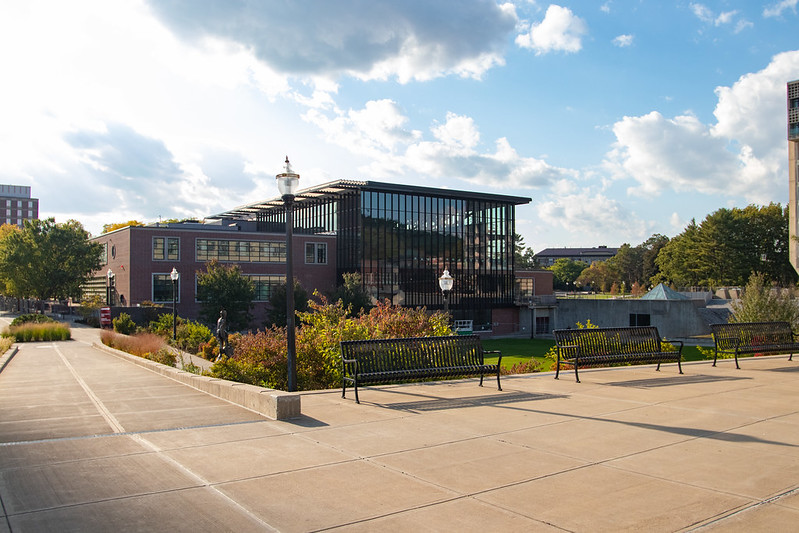
It comes in several shapes, colors and doses. Some prefer the extended release, while others seek out immediate effects. While to most the drug is known as Adderall, some refer to it as a miracle drug.
Adderall, nicknamed “Addy” by some students, is a prescription drug used to sharpen focus and, for some, to finish assignments quickly. Students boast that one or two pills can boost cognitive function and allow them to study for hours on end with full concentration and without fatigue.
One University of Massachusetts student, who wished to remain anonymous, plans to use the “study drug” to get through her upcoming final exams.
While she does not have a prescription for Adderall, she said it wasn’t hard to find. “I just had to ask around,” she said. For $5 a pill, she said she gains a focus that makes her “just want to do homework.”
The sophomore said she tried the study drug for the first time this semester, while cramming for a calculus exam. While she said it made her jittery initially, she described how it gave her the ability to work through the night.
Adderall, or amphetamine-dextroamphetamine, entered the pharmaceutical market in the 1960s as a diet pill. It is currently classified as a stimulant medication and appetite suppressant, widely used to treat Attention Deficit Hyperactivity Disorder (ADHD).
The prescription pill stimulates the central nervous system by increasing the amount of certain chemicals in the brain, such as dopamine and norepinephrine. These chemicals, or neurotransmitters, help the brain send signals between nerve cells.
It also helps restore the balance of neurotransmitters to the parts of the brain that control the ability to focus and pay attention.
According to a November 2001 study by Project Pulse of the Office of Student Affairs at UMass, 21.6 percent of students surveyed said they used stimulants such as speed or Adderall recreationally in a given year. Of the 1,116 students who were surveyed, 16 percent said they had taken stimulants in the last month for recreational purposes.
Approximately two to four percent of college students in the United States are on medication for Attention Deficit Hyperactive Disorder, more commonly known as ADHD, according to George DuPaul, a professor in the school of psychology at Lehigh University in Pennsylvania who recently published a study on college students with ADHD.
The main source of Adderall, or the similar prescription pill Ritalin, for students, is from other students, he found. Another UMass student, who also wished to remain anonymous, said he was diagnosed with ADHD in seventh grade, and has been on Adderall since the fall of 2008.
“Adderall helps me focus while I am studying and while I am at work. I have to time it correctly at night, though, because I can’t sleep at all if there is any left in my system,” he said.
The student said he has two prescriptions to treat his ADHD – a four-hour immediate release pill of 10 mg of Adderall, and an eight-hour extended release pill similar to Adderall called Vyvanse.
Friends and fellow students ask him on a regular basis to share his prescription pills “probably once every week or two,” he said. “People ask more for them around exam time.”
Around exam time the price of pills often escalates, and can reach even $25 a pill, the student said.
The pills are frequently sold in dormitories, in the library, and are available almost anywhere on-campus. The student said he only sells to people he knows, for fear of repercussions. “I will only sell them to my close friends, and even that I don’t like to do too often, because I don’t want my name to get out as a dealer.”
While the drug is considered by many students to be a miracle, and can help them study late into the night, there are negative side effects that come with snorting or swallowing the pill.
The drugs are amphetamine-based, meaning they are highly addictive, a factor some take into consideration before pill-popping.
“Sometimes [I worry about getting addicted,]” said a UMass student who has taken Adderall several times. “But I know I can do without it.”
Of the drug category that study drugs are placed in, University Health Services states on its website that “stimulants can be addictive.” “Using prescribed stimulants might not lead to physical dependence and withdrawal, but the user might have a hard time stopping because of the effects the drugs produce.”
According to UHS, the use of stimulants recreationally can lead to “increased heart rate and blood pressure, increased energy, rapid or irregular heart beat, reduced appetite, increased body temperature, tremor, paranoia, restlessness, aggressiveness and panic.”
Michelle Williams can be reached at [email protected].













Concerned Citizen • Dec 10, 2010 at 7:20 am
“Using prescribed stimulants might not lead to physical dependence and withdrawal, but the user might have a hard time stopping because of the effects the drugs produce.”
—- this is perhaps the most irresponsible thing I have ever seen UHS state, and this from folk already so incompetent that they ought to paint “Death Services” on the doors of their vehicles. Using **ANY** prescribed substance (can we say “birth control pills”?) in a non-therapeutic manner can be rather unhealthy. Even water can be deadly — a frat in upstate NY killed a few pledges a while back by having them drink it by the five gallon canful and it messed up their electrolytes so badly that they died of heart attacks. As did a woman in Cali in some radio promotion stunt.
Birth control pills will increase breast size — in women or men — they are powerful hormones that trick the body into believing it is that of a pregnant woman. Yes, there probably are women (and men) using birth control pills in a non-therapeutic manner (to feel more feminine) and they, too, “will have a hard time stopping because of the effects they produce” (like bigger breasts…)
But there are also a lot of women taking B/C for the exact purpose for which it was prescribed (TO THEM) and taking it correctly (and in the amount prescribed) and we would have folks screaming at the top of their lungs were an article like this to appear about birth control pills. Prescription drugs used properly (as prescribed by a competent physician) are safe, effective and NOT DRUG ABUSE!
The interesting thing about the Schedule II drugs — essentially the stimulants and narcotics — is that if you NEED them, you don’t get high on them. Yes, there are some initial side effects, but ask someone who is dying of cancer and is on enough morphine to get half of SouthWest high if they even know the difference and they will tell you only that it reduces the pain enough for them to enjoy the few days they have left.
And if you have ever seen such people – ever spent the last few days with a loved one in such condition – you won’t notice it either because the person is NOT high. The opiates are all being used to suppress the pain responses, there aren’t any left to create the “high” effect.
“According to UHS, the use of stimulants recreationally can lead to “increased heart rate and blood pressure, increased energy, rapid or irregular heart beat, reduced appetite, increased body temperature, tremor, paranoia, restlessness, aggressiveness and panic.””
Yes. And what the incompetent schmucks at UDS (University Death Services) fail to add is that when used by a person with a legitimate need for them, he probably will fall asleep. Seriously, these drugs – once the person has adjusted to them – tend to calm down a person with Attention Deficit, sort of like acting like a sedative.
Think of how the TASER works — it uses an electrical shock to overwhelm the central nervous system and we have all seen the videos. A person with either Attention Deficit Primarily Hyperactive or Attention Deficit Primarily Inattentive (or both) essentially is dealing with this all the time — too much traffic going over the central nervous system (CNS) for it to process. (Usually these people are exceedingly bright.) What a CNS stimulant (ie Adderall) does is to speed up the CNS, in computer terms to “overclock” the system, making it function at a higher speed.
In a person where the CNS is already functioning at the right speed this creates all the aspects of “speed” that are reported by those discussing the abuse of this powerful psychoactive drug. However in a person whose CNS isn’t running fast enough, speeding it up allows the traffic to get through, thus calming the person. Now if you continue to speed up the CNS, if a person with a legitimate need for Adderall then takes extra, you will see the same things as with recreational use, but that is another thing entirely.
There is no excuse for Death Services and their prohibitionists to attack the legitimate use of pharmopsychology. They are worse than the Scientologists, and that is saying something….
RP • Dec 8, 2010 at 8:56 am
why do they opt to pay for the drug when they can just have something similar by producing drug-at-home?
caffeine+coke+6 500mg paracetamols in one drink. HEAVEN. You wont sleep for 2 days. Yay. but you’ll probably get a bit high too.